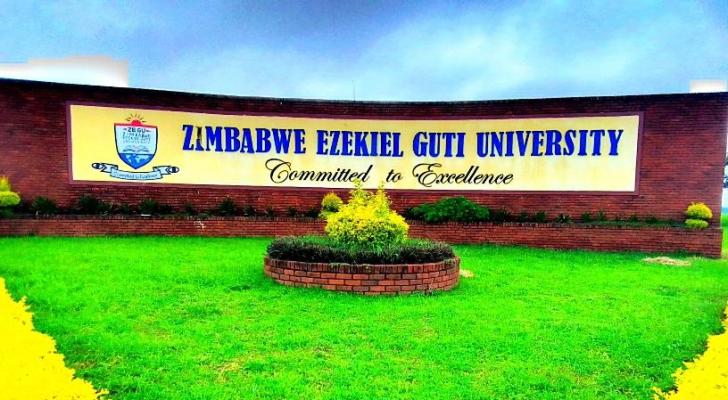News / National
Zaoga's Ezekiel Guti University faces demolition?
17 May 2025 at 16:34hrs |
5 Views

The Zimbabwe Assemblies of God Africa (Zaoga) has filed an urgent chamber application with the High Court seeking to halt the eviction and demolition of the Zimbabwe Ezekiel Guti University (Zegu) in Bindura, following a default judgment that awarded the land to gold miner Mr Charles Chakumba.
The High Court recently ruled in favour of Mr Chakumba after Zaoga and its legal representatives failed to attend a pre-trial conference. Justice Joseph Musakwa granted a default order compelling the church to vacate the premises to allow Chakumba to freely conduct his mining operations on claims he was allocated at Barasse Farm in 1994 by the Ministry of Mines and Mining Development.
Chakumba, represented by lawyer Mr Vusani Bangidza of Tavenhave and Machingauta Legal Practitioners, argued that his gold mining claims—numbered 22441 and 22442—have long-standing legal recognition. He further asserted that Zaoga's presence on the site, where it built its multimillion-dollar university in 2010, has obstructed his right to mine.
In response, Zaoga, through its lawyers Debwe and Partners, filed an urgent application this week seeking to stay the execution of the judgment pending the outcome of a rescission application. The church said its failure to appear at the pre-trial conference was due to a clerical error by its legal secretary, who misfiled the notice and incorrectly recorded the date as March 16 instead of March 3.
"The said judgment was obtained in default at the pre-trial conference as a result of a genuine mistake," the church argued in its court filing. Zaoga claimed it only learned of the court order on March 7 after reading about it in The Herald newspaper.
The church now seeks an interim interdict to prevent Mr Chakumba from evicting Zegu's students and staff, or demolishing the university infrastructure, until the matter is fully adjudicated.
Chakumba, who initiated legal action in 2015, insists that Zaoga has been illegally occupying the land, despite being cautioned to vacate. He says the Ministry of Mines confirmed him as the legitimate holder of the mining claims and accused the church of blocking him from exercising his rights.
Zaoga, however, argues that the land was lawfully allocated to it by the Bindura Municipality in 2008, in consultation with the Ministry of Local Government, Public Works and National Housing. The church maintains that the miner's case should be dismissed on the grounds that it was filed beyond the three-year statutory period stipulated under the Prescription Act.
"Plaintiff became aware of Zegu's occupation of the land in February 2010. His claim arose then, but the summons were only served in August 2015—well beyond the three-year limit," the church contended.
As the legal battle intensifies, the fate of Zimbabwe Ezekiel Guti University, a flagship educational institution named after Zaoga's late founder, hangs in the balance. The case has ignited a broader debate about conflicting land rights between public infrastructure projects and pre-existing mineral claims.
The High Court recently ruled in favour of Mr Chakumba after Zaoga and its legal representatives failed to attend a pre-trial conference. Justice Joseph Musakwa granted a default order compelling the church to vacate the premises to allow Chakumba to freely conduct his mining operations on claims he was allocated at Barasse Farm in 1994 by the Ministry of Mines and Mining Development.
Chakumba, represented by lawyer Mr Vusani Bangidza of Tavenhave and Machingauta Legal Practitioners, argued that his gold mining claims—numbered 22441 and 22442—have long-standing legal recognition. He further asserted that Zaoga's presence on the site, where it built its multimillion-dollar university in 2010, has obstructed his right to mine.
In response, Zaoga, through its lawyers Debwe and Partners, filed an urgent application this week seeking to stay the execution of the judgment pending the outcome of a rescission application. The church said its failure to appear at the pre-trial conference was due to a clerical error by its legal secretary, who misfiled the notice and incorrectly recorded the date as March 16 instead of March 3.
"The said judgment was obtained in default at the pre-trial conference as a result of a genuine mistake," the church argued in its court filing. Zaoga claimed it only learned of the court order on March 7 after reading about it in The Herald newspaper.
The church now seeks an interim interdict to prevent Mr Chakumba from evicting Zegu's students and staff, or demolishing the university infrastructure, until the matter is fully adjudicated.
Chakumba, who initiated legal action in 2015, insists that Zaoga has been illegally occupying the land, despite being cautioned to vacate. He says the Ministry of Mines confirmed him as the legitimate holder of the mining claims and accused the church of blocking him from exercising his rights.
Zaoga, however, argues that the land was lawfully allocated to it by the Bindura Municipality in 2008, in consultation with the Ministry of Local Government, Public Works and National Housing. The church maintains that the miner's case should be dismissed on the grounds that it was filed beyond the three-year statutory period stipulated under the Prescription Act.
"Plaintiff became aware of Zegu's occupation of the land in February 2010. His claim arose then, but the summons were only served in August 2015—well beyond the three-year limit," the church contended.
As the legal battle intensifies, the fate of Zimbabwe Ezekiel Guti University, a flagship educational institution named after Zaoga's late founder, hangs in the balance. The case has ignited a broader debate about conflicting land rights between public infrastructure projects and pre-existing mineral claims.
Source - online
Join the discussion
Loading comments…
































